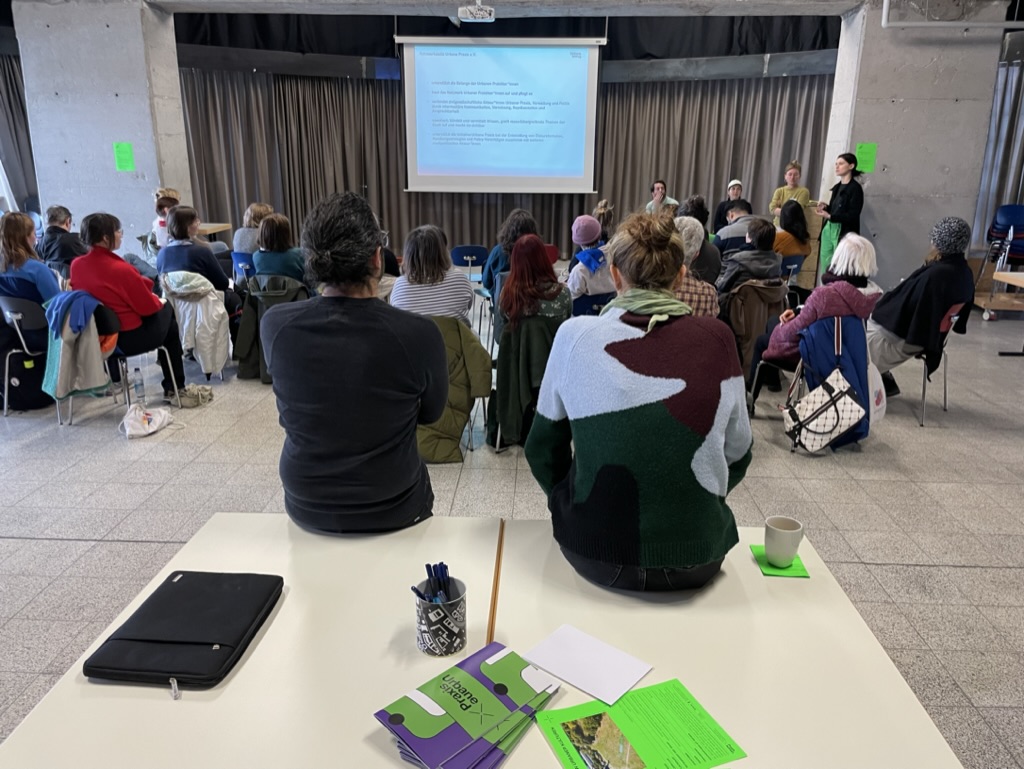Networking meeting on urban practice & district social space-oriented planning coordination centers
On 17 January 2024, the Urban Practice Network Office organized a networking meeting with the district social space-oriented planning coordinators (SPK for short) and the Berlin Project Fund for Urban Practice (BPUP for short).
The background to the joint meeting was the potential to connect un(under)utilized urban spaces with committed urban design initiatives. There are many rooms and spaces throughout Berlin that are currently unused or underused. It is often unclear who manages these areas and it quickly becomes confusing when it comes to navigating between the city cleaning department, the roads and green spaces department and the building authority. The pilot study initiated by Urbane Praxis e.V. on the action and development concept for Zobtener Strasse in Berlin Lichtenberg addresses this situation. It calls for closer cooperation between interdepartmental and internal administrative players to make use of underused areas together with initiatives for the common good and civil society involvement.
Background
Recently, the German government has also recognized that urban design must be considered as a cross-cutting issue across all disciplines and levels of society. To counter this situation, the Berlin Senate introduced the organizational unit of social space-oriented planning coordination. At district level, information flows between administration, politics, business and civil society are to be promoted with regard to socio-spatial developments. Nevertheless, municipal budgets have been under severe strain, and not just since the coronavirus pandemic, and human resources appear to be becoming increasingly scarce. So how can space be made available to urban society as efficiently as possible and developed jointly?
Urbane Praxis e.V. & Berliner Projektfonds Urbane Praxis
The city-wide network of Urbane Praxis e.V. makes an important contribution to answering this question. The association and its members are located at the interface between art, culture, architecture, education and social issues. Through intermediary exchange and the implementation of experimental formats, it promotes a holistic view of the city as an organism and at the same time drives forward urban and spatial development in Berlin that is oriented towards the common good. The Berliner Projektfonds Urbane Praxis on the other hand, provides annual funding for art and culture in public spaces, thus helping to relieve the pressure on municipal budgets and human resources.
Networking meeting
However, there is currently no consistent or standardized process in Berlin for linking vacant spaces and civic engagement in a long-term and targeted manner. Making this visible through the pilot study struck a nerve: 10 out of 12 Berlin districts were present at the networking meeting on January 17, 2024. The joint workshop with the administration, the representatives of Urbane Praxis e.V. and the Berlin Project Fund Urbane Praxis was therefore intended to outline initial proposals that would work towards a standardized land allocation procedure. Opportunities and challenges were mentioned. Finally, a pilot phase was jointly agreed that emphasizes the special role of Urbane Praxis e.V.: in future, urban practitioners will be able to contact the association with their space requirements, which in turn will refer them to the relevant planning coordinators in the districts. This first attempt at a procedure will be tested in 2024 and supported by the Space Working Group, sponsored by the Urban Practice e.V. network office. Further networking meetings and the development of a best practice approach are planned.
1 Bundesministerium für Verkehr, Bau und Stadtentwicklung, 2010 https://www.bbsr.bund.de/BBSR/DE/veroeffentlichungen/ministerien/bmvbs/sonderveroeffentlichungen/2010/DL_MiteinanderStadtEntwickeln.pdf;jsessionid=766169D7504B814F5127146E0945E878.live21321?__blob=publicationFile&v=1
2 Deutscher Städte- und Gemeindebund, 2021 https://www.dstgb.de/publikationen/pressemitteilungen/enorme-belastungen-fuer-kommunale-haushalte/
